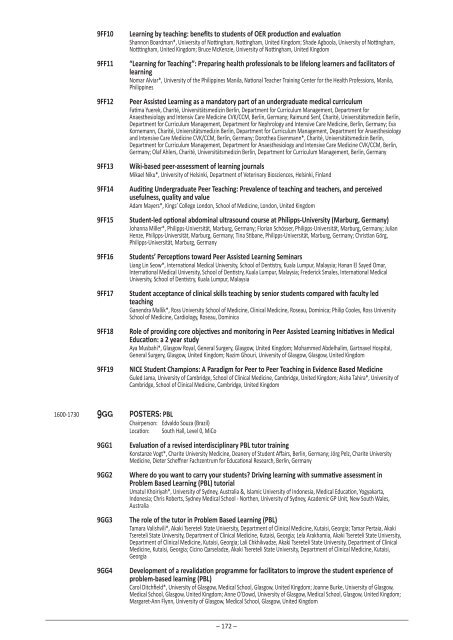AbNXb
AbNXb
AbNXb
You also want an ePaper? Increase the reach of your titles
YUMPU automatically turns print PDFs into web optimized ePapers that Google loves.
9FF10<br />
9FF11<br />
9FF12<br />
9FF13<br />
9FF14<br />
9FF15<br />
9FF16<br />
9FF17<br />
9FF18<br />
9FF19<br />
Learning by teaching: benefits to students of OER production and evaluation<br />
Shannon Boardman*, University of Nottingham, Nottingham, United Kingdom; Shade Agboola, University of Nottingham,<br />
Notttingham, United Kingdom; Bruce McKenzie, University of Nottingham, United Kingdom<br />
“Learning for Teaching”: Preparing health professionals to be lifelong learners and facilitators of<br />
learning<br />
Nomar Alviar*, University of the Philippines Manila, National Teacher Training Center for the Health Professions, Manila,<br />
Philippines<br />
Peer Assisted Learning as a mandatory part of an undergraduate medical curriculum<br />
Fatima Yuerek, Charité, Universitätsmedizin Berlin, Department for Curriculum Management, Department for<br />
Anaesthesiology and Intensiv Care Medicine CVK/CCM, Berlin, Germany; Raimund Senf, Charité, Universitätsmedizin Berlin,<br />
Department for Curriculum Management, Department for Nephrology and Intensive Care Medicine, Berlin, Germany; Eva<br />
Kornemann, Charité, Universitätsmedizin Berlin, Department for Curriculum Management, Department for Anaesthesiology<br />
and Intensive Care Medicine CVK/CCM, Berlin, Germany; Dorothea Eisenmann*, Charité, Universitätsmedizin Berlin,<br />
Department for Curriculum Management, Department for Anaesthesiology and Intensive Care Medicine CVK/CCM, Berlin,<br />
Germany; Olaf Ahlers, Charité, Universitätsmedizin Berlin, Department for Curriculum Management, Berlin, Germany<br />
Wiki-based peer-assessment of learning journals<br />
Mikael Niku*, University of Helsinki, Department of Veterinary Biosciences, Helsinki, Finland<br />
Auditing Undergraduate Peer Teaching: Prevalence of teaching and teachers, and perceived<br />
usefulness, quality and value<br />
Adam Mayers*, Kings’ College London, School of Medicine, London, United Kingdom<br />
Student-led optional abdominal ultrasound course at Philipps-University (Marburg, Germany)<br />
Johanna Miller*, Philipps-Universität, Marburg, Germany; Florian Schösser, Philipps-Universität, Marburg, Germany; Julian<br />
Henze, Philipps-Universität, Marburg, Germany; Tina Stibane, Philipps-Universität, Marburg, Germany; Christian Görg,<br />
Philipps-Universität, Marburg, Germany<br />
Students’ Perceptions toward Peer Assisted Learning Seminars<br />
Liang Lin Seow*, International Medical University, School of Dentistry, Kuala Lumpur, Malaysia; Hanan El Sayed Omar,<br />
International Medical University, School of Dentistry, Kuala Lumpur, Malaysia; Frederick Smales, International Medical<br />
University, School of Dentistry, Kuala Lumpur, Malaysia<br />
Student acceptance of clinical skills teaching by senior students compared with faculty led<br />
teaching<br />
Ganendra Mallik*, Ross University School of Medicine, Clinical Medicine, Roseau, Dominica; Philip Cooles, Ross University<br />
School of Medicine, Cardiology, Roseau, Dominica<br />
Role of providing core objectives and monitoring in Peer Assisted Learning Initiatives in Medical<br />
Education: a 2 year study<br />
Aya Musbahi*, Glasgow Royal, General Surgery, Glasgow, United Kingdom; Mohammed Abdelhalim, Gartnavel Hospital,<br />
General Surgery, Glasgow, United Kingdom; Nazim Ghouri, University of Glasgow, Glasgow, United Kingdom<br />
NICE Student Champions: A Paradigm for Peer to Peer Teaching in Evidence Based Medicine<br />
Guled Jama, University of Cambridge, School of Clinical Medicine, Cambridge, United Kingdom; Aisha Tahira*, University of<br />
Cambridge, School of Clinical Medicine, Cambridge, United Kingdom<br />
1600-1730 9GG POSTERS: PBL<br />
Chairperson: Edvaldo Souza (Brazil)<br />
Location: South Hall, Level 0, MiCo<br />
9GG1<br />
9GG2<br />
9GG3<br />
9GG4<br />
Evaluation of a revised interdisciplinary PBL tutor training<br />
Konstanze Vogt*, Charite University Medicine, Deanery of Student Affairs, Berlin, Germany; Jörg Pelz, Charite University<br />
Medicine, Dieter Scheffner Fachzentrum for Educational Research, Berlin, Germany<br />
Where do you want to carry your students Driving learning with summative assessment in<br />
Problem Based Learning (PBL) tutorial<br />
Umatul Khoiriyah*, University of Sydney, Australia &, Islamic University of Indonesia, Medical Education, Yogyakarta,<br />
Indonesia; Chris Roberts, Sydney Medical School - Northen, University of Sydney, Academic GP Unit, New South Wales,<br />
Australia<br />
The role of the tutor in Problem Based Learning (PBL)<br />
Tamara Valishvili*, Akaki Tsereteli State University, Department of Clinical Medicine, Kutaisi, Georgia; Tamar Pertaia, Akaki<br />
Tsereteli State University, Department of Clinical Medicine, Kutaisi, Georgia; Lela Arakhamia, Akaki Tsereteli State University,<br />
Department of Clinical Medicine, Kutaisi, Georgia; Lali Chkhikvadze, Akaki Tsereteli State University, Department of Clinical<br />
Medicine, Kutaisi, Georgia; Cicino Qarseladze, Akaki Tsereteli State University, Department of Clinical Medicine, Kutaisi,<br />
Georgia<br />
Development of a revalidation programme for facilitators to improve the student experience of<br />
problem-based learning (PBL)<br />
Carol Ditchfield*, University of Glasgow, Medical School, Glasgow, United Kingdom; Joanne Burke, University of Glasgow,<br />
Medical School, Glasgow, United Kingdom; Anne O’Dowd, University of Glasgow, Medical School, Glasgow, United Kingdom;<br />
Margaret-Ann Flynn, University of Glasgow, Medical School, Glasgow, United Kingdom<br />
– 172 –


